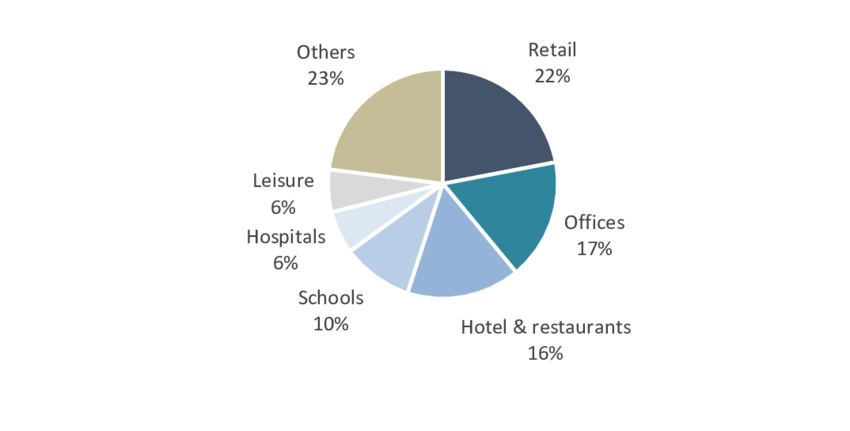Here are some general trends and initiatives related to energy consumption and energy-saving systems in the UK:
- Government Initiatives:
- The UK government has set ambitious targets to reduce carbon emissions and transition to a low-carbon economy. Various initiatives and policies aim to improve energy efficiency across sectors.
- Energy Performance Certificates (EPC):
- EPCs are required for properties in the UK, providing information about a building’s energy efficiency. Property owners and buyers can use this information to make informed decisions about energy-saving measures.
- Renewable Energy Integration:
- The UK has been investing in renewable energy sources such as wind, solar, and tidal power. This shift towards renewables contributes to reducing dependence on traditional energy sources and lowering overall energy consumption.
- Smart Meters:
- The deployment of smart meters has been encouraged to help consumers monitor and manage their energy usage more effectively. Smart meters provide real-time information, enabling consumers to make informed decisions about their energy consumption.
- Building Regulations:
- The UK government periodically updates building regulations to improve the energy efficiency of new constructions and renovations. This includes standards for insulation, heating systems, and overall energy performance.
- Energy-efficient Appliances:
- The UK has been promoting the use of energy-efficient appliances through labeling and certification programs. Consumers are encouraged to choose appliances with high energy efficiency ratings.
- Energy Saving Trust:
- The Energy Saving Trust is an organization that provides information, advice, and support on energy efficiency. It offers various programs and resources to help individuals and businesses reduce their energy consumption.
- Green Finance Initiatives:
- Financial incentives and schemes are in place to encourage businesses and individuals to invest in energy-efficient technologies. This includes grants, subsidies, and tax incentives.
- Corporate Responsibility:
- Many businesses in the UK are adopting sustainable and energy-efficient practices as part of their corporate social responsibility initiatives. This includes implementing energy management systems and adopting green technologies.
What is UK doing to save energy?
Here are some key actions and initiatives that were in place or underway in the UK:
- Net Zero by 2050:
- The UK government has committed to achieving net-zero carbon emissions by 2050. This ambitious goal involves a comprehensive approach to reduce greenhouse gas emissions across sectors, including energy production, transportation, and buildings.
- Renewable Energy Investment:
- The UK has been investing heavily in renewable energy sources such as wind, solar, and tidal power. Offshore wind farms, in particular, have become a significant contributor to the country’s energy mix.
- Energy Efficiency Programs:
- Various energy efficiency programs and initiatives have been introduced to encourage businesses and individuals to adopt energy-saving measures. This includes grants, subsidies, and support for improving the energy performance of buildings.
- Green Finance and Incentives:
- Financial incentives, tax breaks, and green financing options are available to encourage businesses and households to invest in energy-efficient technologies and practices.
- Smart Meter Rollout:
- The UK has been actively deploying smart meters to homes and businesses. Smart meters provide real-time information on energy consumption, helping consumers make informed decisions to reduce their energy usage.
- Energy Performance Certificates (EPCs):
- EPCs are mandatory for properties in the UK, providing information about a building’s energy efficiency. This helps property owners and tenants understand the energy performance of a building and make improvements.
- Building Regulations:
- Building regulations are regularly updated to improve the energy efficiency of new constructions and renovations. Standards for insulation, heating systems, and overall energy performance are part of these regulations.
- Electric Vehicles (EVs):
- The promotion of electric vehicles is part of the UK’s efforts to reduce emissions from the transportation sector. Incentives for EV purchases, expanding charging infrastructure, and promoting public transportation are some of the strategies.
- Energy Saving Trust:
- The Energy Saving Trust, a non-profit organization, provides information and support to individuals and businesses looking to improve energy efficiency. They offer advice on energy-saving technologies and practices.
- Corporate Responsibility:
- Many businesses in the UK are adopting sustainable and energy-efficient practices as part of their corporate social responsibility. This includes measures such as energy management systems, green procurement, and reducing the environmental impact of operations.
What are the 3 main sectors of energy consumption in the UK?
The three main sectors of energy consumption in the United Kingdom are:
- Transportation Sector:
- The transportation sector is a significant consumer of energy in the UK. This includes energy used in road transport, aviation, shipping, and rail. The demand for energy in transportation is met by a combination of fossil fuels and, increasingly, renewable energy sources as the country aims to transition to electric vehicles and other sustainable transportation options.
- Residential and Commercial Sector:
- The residential and commercial sector encompasses energy consumption in homes, offices, retail spaces, and other buildings. This includes heating, cooling, lighting, and the use of appliances. Efforts to improve energy efficiency in buildings, promote the use of energy-efficient appliances, and implement sustainable construction practices are key strategies to reduce energy consumption in this sector.
- Industrial Sector:
- The industrial sector includes energy consumption in manufacturing, processing, and other industrial activities. It is a significant contributor to overall energy demand. Efforts to improve industrial energy efficiency, adopt cleaner technologies, and promote sustainable practices are crucial to reducing the environmental impact of industrial operations.
It’s important to note that the energy landscape and consumption patterns may evolve, and new developments may have occurred since my last update. To obtain the latest and most accurate information on energy consumption sectors in the UK, it’s recommended to refer to the latest reports and data from authoritative sources such as the UK government’s Department for Business, Energy & Industrial Strategy (BEIS) or the International Energy Agency (IEA).



